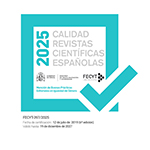Estudio del uso de marcadores discursivos en una adolescente con complejo de esclerosis tuberosa
Resumen
El Complejo de Esclerosis Tuberosa (CET) es un desorden genético que afecta la diferenciación, proliferación y migración celular en los primeros años del desarrollo, esto provoca una amplia variedad de lesiones hamartomatosas que pueden afectar prácticamente cualquier órgano del cuerpo, en especial: la piel, el cerebro, los pulmones, los riñones, el corazón y los ojos. En este contexto, resulta esperable que las personas con CET presenten diversas alteraciones conductuales, cognitivas y lingüísticas. Respecto a las alteraciones del lenguaje, actualmente son escasos los estudios interesados en describir estos déficits, especialmente los que se enfocan en la descripción del lenguaje per se. Por ello, en la presente investigación se analiza la producción lingüística, específicamente el empleo de marcadores discursivos, de una adolescente diagnosticada con CET a través del habla espontánea. Los resultados arrojan que, en nuestra paciente, el uso de marcadores discursivos se mantiene y se emplea de forma convencional, siendo los conectores argumentativos, los metadiscursivos, los reformuladores, formuladores y los modalizadores los más utilizados.
Descargas
Descarga artículo
Licencia
La Revista de Investigación en Logopedia, para fomentar el intercambio global del conocimiento, facilita el acceso sin restricciones a sus contenidos desde el momento de su publicación en la presente edición electrónica, y por eso es una revista de acceso abierto. Los originales publicados en esta revista son propiedad de la Universidad Complutense de Madrid y es obligatorio citar su procedencia en cualquier reproducción total o parcial. Todos los contenidos se distribuyen bajo una licencia de uso y distribución Creative Commons Reconocimiento 4.0 (CC BY 4.0). Esta circunstancia ha de hacerse constar expresamente de esta forma cuando sea necesario. Puede consultar la versión informativa y el texto legal de la licencia.












